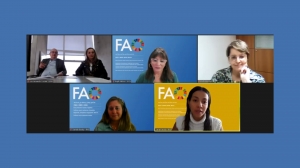Countries discuss solutions and challenges to reduce food losses and waste
Webinar brought together professionals from over 10 countries in Latin America and the Caribbean.

Brasilia, Brazil, April 12, 2024 - Approximately 90 professionals from more than 10 countries in Latin America and the Caribbean convened on April 11 to present and discuss solutions and challenges to reduce food losses and waste, particularly within the scope of school feeding programmes (SFP) and school environments.
The organization of this virtual event was led by the FAO Representation in Colombia and the Food Coalition. The initiative received support from the Sustainable School Feeding Network (RAES), a strategy driven by the Government of Brazil through the Brazilian Cooperation Agency (ABC) and the National Fund for Educational Development (FNDE), with support and secretariat from FAO, through the project Regional Agenda for Sustainable School Feeding in Latin America and the Caribbean (LAC).
Paola Barbieri, a project analyst from ABC/MRE, highlighted that RAES greatly values the exchange of best practices and the dissemination of knowledge about school feeding, with food losses and waste also being part of these discussions. She added that 26 countries have already participated in RAES activities since 2018 and that the network is a "regional space for strengthening institutional and human capacities" to jointly enhance SFP in the LAC region.
Daniela Godoy, FAO Senior Policy Officer for LAC, noted that 13% of food production is lost post-harvest worldwide, impacting social, economic, and environmental aspects. She mentioned that addressing food losses and waste has positive effects on sustainable development, as "many lost or wasted foods are part of a healthy diet." She emphasized the importance of promoting healthy food environments and appropriate school meals, implementing food and nutrition education (FNE) actions, promoting public procurement, and creating a positive political, regulatory, financial, and institutional environment for these efforts.
Najla Veloso, coordinator of the project Regional Agenda for Sustainable School Feeding in LAC, executed under the Brazil-FAO Cooperation, added that school feeding has the potential to impact the environmental agenda as a multisectoral policy involving economy, nutrition, social development, education, agriculture, health, among others. "Discussing food losses and waste today is a huge challenge because it impacts food prices and availability. It's about addressing inclusion, reducing hunger, and dignity."
According to Najla, it is crucial to plan the menus offered in SFP well, organizing processes such as logistics, purchases, deliveries, handling, cooking techniques, washing, and food offerings. Additionally, she stated that it is important to measure the amount of food being wasted and expressed that schools are suitable spaces to address food comprehensively.
Experiences
Luis Fernando Correa, director of the Special Administrative Unit for School Feeding - Food for Learning (UApA) of Colombia, presented a pilot project that evaluated the effectiveness of including gastronomy techniques in 13 schools across 9 departments of the country. The work identified menus with low acceptability and evaluated the amount of waste before and after adjustments with gastronomic techniques. Food handlers were trained, and actions were taken to strengthen the knowledge of the educational community.
Correa shared that the use of local foods and the inclusion of gastronomic techniques improved acceptability among students, proving effective in reducing waste by 41%, especially of vegetables and fruits.
Another experience presented addressed the measurement and prevention model of food waste in services of the Colombian Family Welfare Institute (ICBF), an institution that provides nutritional, educational, and health support to beneficiaries of promotion and prevention programmes, especially vulnerable populations. The initiative was presented by Yazmín Aldana, from FAO in Colombia, who emphasized the importance of strengthening prevention actions, promoting circular economy, supporting local implementation processes of these actions, and considering contractual obligations of service operators.
Laura Arévalo, event moderator and food and nutritional education expert at FAO in Colombia, concluded by emphasizing the need to include food losses and waste monitoring systems, strengthen FNE actions and culturally appropriate menus, highlighting the importance of intersectoral actions and dialogue on the topic to learn from the best experiences at national and regional levels.
Context
This was the third and final webinar in a series of three experience exchanges. The first addressed the importance of regulatory frameworks to strengthen school feeding and promote the guarantee of the human right to adequate food. The second focused on the link between public procurement from family farming and school feeding.
Food Coalition
In 2021, the Governments of Colombia, Ecuador, and El Salvador, through the FAO representations and in conjunction with national governments, expressed interest in developing the project "Strengthening school feeding programmes during and after the COVID-19 pandemic," which seeks to unite efforts to strengthen and scale up school feeding programmes through the Sustainable Schools methodology to contribute to guaranteeing the human right to adequate food. The three countries are supported by the Food Coalition in implementing this methodology, which was developed by Brazil-FAO International Cooperation in 2012 and is already present in 14 countries.
The Food Coalition promoted by FAO is a global alliance of multiple stakeholders to respond to and recover from COVID-19. This initiative aims to mobilize financial resources, innovations, and technical competencies, promote advocacy activities, and establish a neutral space for dialogue among a variety of key stakeholders in support of countries most in need.
